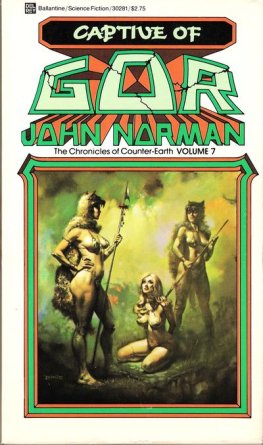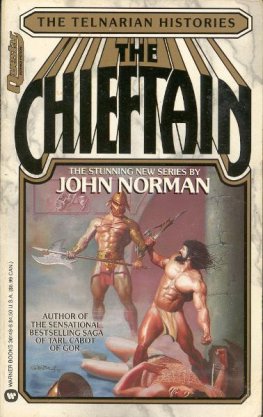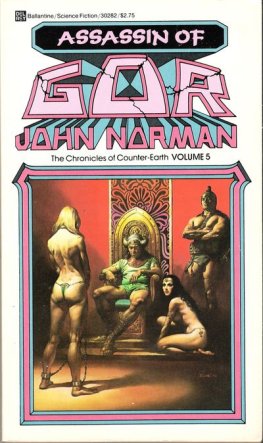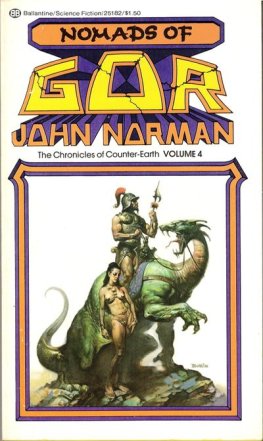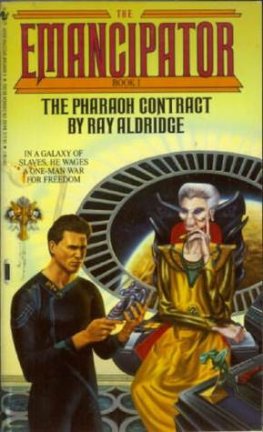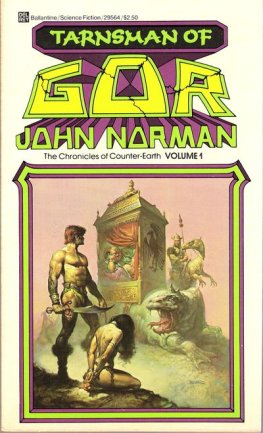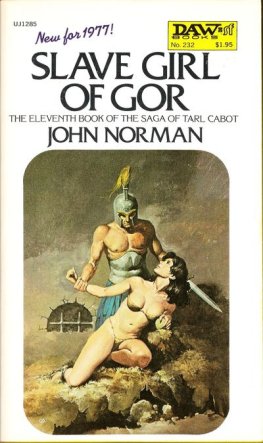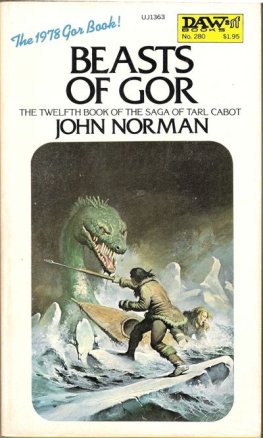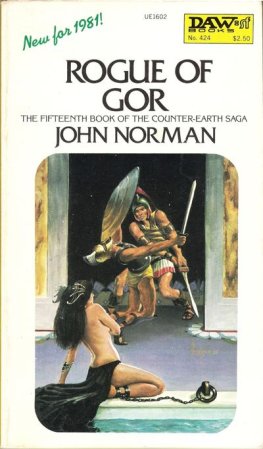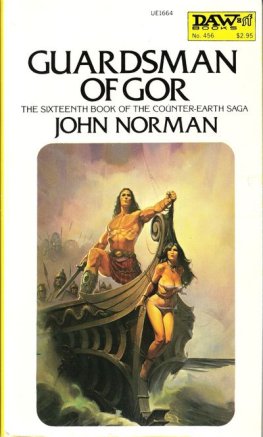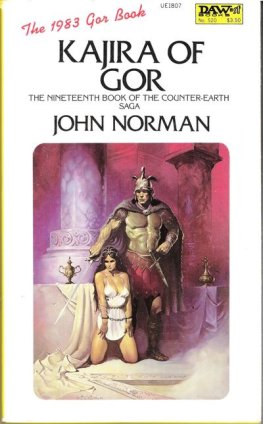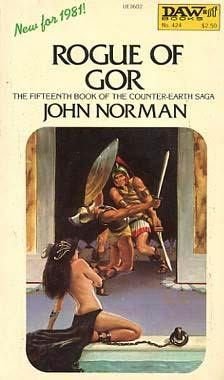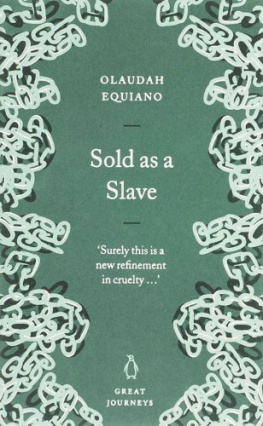FIGHTING SLAVE OF GOR
(Volume Fourteen of the Chronicles of Counter Earth)
by John Norman
Chapter 1 - THE RESTAURANT; THE CAB
"May I speak to you intimately, Jason?" she asked.
"Of course, Beverly," I said.
We sat at a small table, in a corner booth. The small restaurant is located on 128th Street. A candle burned on the table, set in a small container. The linen was white, the silver soft and lustrous in the candlelight.
She seemed distracted.
I had never seen her like this. Normally she was intellectual, prim, collected and cool.
She looked at me.
We were not really close friends. We were more in the nature of acquaintances. I did not understand why she had asked me to meet her at the restaurant.
"It was kind of you to come," she said.
"I was pleased to do so," I said.
Beverly Henderson was twenty-two years old and a graduate student in English literature at one of the major universities in the New York City area. I, too, was a student at the same university, though pursuing doctoral studies in classics, my specialty being Greek historians.
Beverly was a small, exquisitely breasted, lovely ankled, sweetly hipped young woman. She did not fit in well with the large, straight-hipped females who figured prominently in her department. She did her best, however, to conform to the standards in deportment, dress and assertiveness expected of her. She had adopted the clichs and severe mien expected of her by her peers, but I do not think they ever truly accepted her. She was not, really, of their kind. They could tell this.
I looked at Beverly. She had extremely dark hair, almost black. It was drawn back severely on her head, and fastened in a bun. She was lightly complexioned, and had dark brown eyes. She was something in the neighborhood of five feet in height and weighed in the neighborhood of ninety-five pounds. My name is Jason Marshall. I have brown hair and brown eyes, am fairly complexioned, am six feet one inch in height, and weigh, I conjecture, about one hundred and ninety pounds. At the time of our meeting I was twenty-five years old.
I reached out to touch her hand.
She had asked if she might speak to me intimately. Though I appeared calm, my heart was beating rapidly. Could she have detected the feelings I had felt towards her in these past months since I had come to learn of her existence? I found her one of the most exciting women I had ever seen. It is difficult to explain these things. It is not, however, that she was merely extremely attractive. It had rather to do, I think, with some latency of hers that I could not fully understand. Many were the times when I had dreamt of her naked in my arms, sometimes, oddly enough, in a steel collar. I forced such thoughts from my mind.
I had, of course, many times asked her to accompany me to plays, or lectures or concerts, or to have dinner with me, but she had always refused. It did not seem, however, that I was unique in collecting this disappointing parcel of rejections. Many men, it seemed, had had as little luck as I with the young, lovely Miss Henderson. As far as I could tell she seldom dated. I had seen her once or twice about the campus, however, with what I supposed might be male friends. They seemed inoffensive and harmless enough. Their opinions, I suppose, conformed to the correct views. She would have little to fear from them, save perhaps boredom. Then, this evening, she had called me on the telephone, asking me to meet her at this restaurant. She had not explained. She had said only that she had wanted to talk with me. Puzzled, I had taken a subway to the restaurant. I would take her home, of course, in a cab.
She had asked if she might speak to me intimately. I touched her hand.
She drew her hand back. "Do not do that," she said.
"I'm sorry," I said.
"I don't like that sort of thing," she said.
"I'm sorry," I said.
I was irritated. But I was now more puzzled than ever.
"Do not try to be masculine with me," she said. "I am a woman."
"Did that come out right?" I asked, smiling.
"I mean 'I am a person'," she said. "I have a mind. I am not a sex object, not a thing, a toy, a bauble."
"I'm sure you have a mind," I said. "If you didn't, you would be in a very serious condition."
"Men do not value women except for their bodies."
"I did not know that," I said. "That sounds like something that would be said only by a woman whom it would be very difficult to value for her body."
"I do not like men," she said. "And I do not even like my self."
"I do not understand the purport of this conversation," I said.
In so brief a compass it seemed to me that she had touched on two of the major ambiguities afflicting the politics she espoused. First there was the insistence on womanhood coupled simultaneously with the suppression of womanhood, exalting the neuteristic, sexless ideal of the person. One must be insistent on being a woman, rhetorically, and yet the last thing one must be is honest to one's womanhood. The ideal of the person was the antithesis to honest sexuality, a device to inhibit and reduce, if not destroy, it.
It was, of course, a useful instrumentality to certain types of women in the pursuit of their political ambitions. In a sense I thought this wise on their part. They had the good sense to recognize that the sexuality of human beings, and love, was the major obstacle to the success of their programs. The desire of women to find love might yet prove fatal to their designs.
The second major ambiguity in the politics involved was the paradoxical combination of hostility toward men coupled with envy of men. Most briefly put, on the level of primitive simplicity, such women hated men and yet wished to be men. They hated men because they were not men. A natural consequence of this, of course, was that they, unhappy with themselves, felt hostility toward themselves as well. The answer to this latter difficulty might be a simple one, namely to accept what one is, in its fullness and depth, for the man to accept manhood, and the woman womanhood, whatever it might involve.
"The sexes are identical," she said.
"I did not know that," I said.
"I am just the same as you," she said.
"I see no point in entering into an argument on this issue," I said. "What would you accept as counter-evidence?"
"Some unimportant, minor differences in anatomical details are all that divide us," she said.
"What of ten thousand generations of animal ancestry and evolution, of the genetic dispositions in billions of cells, not one of which is the same in your body as in mine?"
"Are you a sexist?" she asked.
"Perhaps," I said. "I do not know. What is a sexist?"
"A sexist is a sexist," she said.
"That is a logical truth," I said. "An apple is an apple. The argument is not much advanced."
"The concept is vague," she said.
"There is little if any concept involved," I said. "The expression is a 'signal word,' a word selected for its emotive connotation, not its cognitive meaning. It is to be used as a slander tool to discourage questioning and enforce verbal agreement. Similar expressions, once meaningful, now largely of value as rhetorical devices are 'chauvinist', 'sex object', 'person', 'conservative' and 'liberal'. One of the great utilities of these words, long since evacuated of most of their cognitive content, is that they make thought unnecessary. It is little wonder men value them so highly."
"I do not believe you," she said. "You may not share my values."
"Does that disturb you?" I asked.
"No," she said, quickly, "of course not!"
I was growing angry. I slipped from the booth.
"No," she said, "please do not go!" She reached forth and took my hand. Then, swiftly, she released it. "Forgive me," she said, "I did not mean to be feminine."


